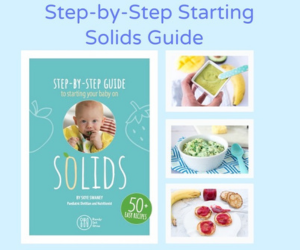Before I had kids, I thought there was no way a child of mine was going to be a fussy eater.
Firstly, I love food – all food (well, almost!) – and secondly, I thought since I knew all about the causes of fussy eating, I’d have the right tricks to ensure my children ate a beautifully balanced diet and didn’t develop any fussy eating tendencies…..well, was I in for a rude shock!
I’m a dietitian and my child is a fussy eater
My firstborn is a typical fussy eater. He started off well as a baby (as many do) and ate literally anything I put in front of him – from broccoli to curry.
But at around 16 months, this all started to change and before I knew it, I had my very own fussy eater.
These days, most of the time the only vegetable he willingly eats is a carrot and he turns his nose up at the majority of the food I serve.
Not exactly what I had pictured pre-kids!
What having a fussy eater has taught me about fussy eating
While it’s not easy, on the up side, dealing with my very own fussy eater has taught me more about fussy eating than any of the study I’ve done or any of the families I’ve worked with.
I’ve learned many tips and tricks to deal with his frustrating food preferences and provide the closest thing I can to a balanced diet.
But the two biggest things it’s taught me are:
- Fussy eating is very normal
- Our children’s eating behaviours and preferences aren’t entirely in our control
I often hear parents – usually mothers – say something along the lines of ‘I think it’s my fault my child is fussy because I did xyz when they were a baby/didn’t eat enough vegetables when I was pregnant/let them eat sugar once before they were two’…etc.
And while we do have a lot of influence over what and how our kids eat, the truth is that a lot of it probably isn’t because of anything you’ve done or not done, at least some of it actually comes down to your child’s genetics and personality.
Children are born with their own innate eating behaviour
Some kids are born food lovers and others are indifferent – in fact, often both types will exist within the same family with the same environment and the same food.
Of course, kids eating habits and preferences will be influenced by their environment as they grow up, but studies have shown that around 46% of food fussiness is actually genetic.
There are also other biological factors that mean children are likely to become fussy during the toddler years, including:
- Neophobia
This literally translates to ‘fear of new’. Children are naturally afraid of new foods which is likely an inbuilt survival instinct to prevent them from eating something they shouldn’t (i.e. something poisonous). In some ways we can be thankful for this inbuilt safety measure as it – hopefully – stops them from eating anything and everything they come across.
- Developing independence
This is a big one. When your baby becomes a toddler, they start developing their own independence and love nothing more than to experiment with it! Often one of their favourite ways to do this is by refusing to eat what you offer them. This really comes down to control – there’s not a whole lot they can control in their lives just yet, but what goes in their mouth is one of them!
So what CAN we do to help improve fussy eating:
- Firstly, relax
It’s totally understandable to worry about your child’s diet, but it’s important to remember that fussy eating is very normal during the toddler and early childhood years and usually improves with time (and does not reflect your success as a parent!). Although, having said that, it is important to continue to offer a wide variety of foods.
- Embrace the phrase ‘parents provide, kids decide’
That means no pressure to eat, no bribing or bargaining, just continue to offer a wide range of foods and let your child decide what they want to eat from what’s offered. Avoid entering into a power struggle with your child as this only tends to make matters worse.
- Exposure, exposure, exposure
The more a child is exposed to a food, the more familiar it becomes and the more likely they are to learn to like it, so repeated exposure is key. Continue to offer small amounts of rejected foods with no pressure to eat them. Remember, even having a particular food on their plate counts as exposure! Be consistent and don’t give up – all your hard work may feel like a big waste of time and effort, but rest assured it will pay off eventually.
- Serve the same meal to the whole family as much as possible
This tends to result in a greater variety of foods being offered and more exposure to different foods. Plus, it’s a lot less work for you!
- Serve new or ‘learning to like foods’ alongside a liked or familiar food
Nothing makes a fussy eater freak out like sitting down to a meal made up entirely of foods they don’t like. But by serving these foods alongside a food they do accept, your child knows there is something they feel comfortable eating and feels less pressured to eat something they’re not sure about. It may even mean they’re more likely to try something they otherwise wouldn’t.
- Eat together if you can
If your child sees you eating something, they’re more likely to try it. But don’t stress if eating together isn’t an option every night (or any night!), just do it if, and when it works for your family – even a weekend breakfast or lunch together is a great start.
As long as your child is growing adequately and is otherwise well, they’re most likely getting the nutrition they need.
However, sometimes fussy eating can be more serious, particularly if your child is having difficulty eating, the number of accepted foods is very limited or is affecting growth and development.
Speak to your doctor or maternal child health nurse if you’re concerned and consider consulting a paediatric dietitian.








